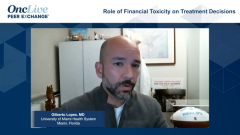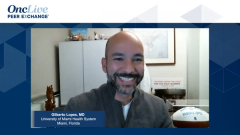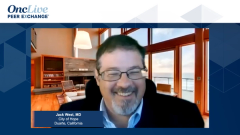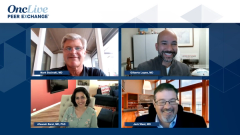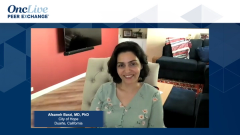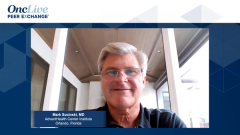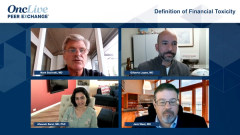
Pharmacoeconomic Considerations for Immunotherapy
Gilberto Lopes, MD, Jack West, MD, and Mark Socinski, MD, provide their insight on the pharmacoeconomic considerations for immunotherapy.
Episodes in this series

Mark Socinski, MD: Gilberto, in your neck of the woods, to your patients and to your health care system, what are the pharmacoeconomic considerations for I/O [immuno-oncology] therapy?
Gilberto Lopes, MD: Without a doubt, I/O includes and increases cost. In terms of formal cost-effectiveness evaluations, these have been better than what we see in marketing, but they’re still in place for settings where cost is a bigger issue. I/O therapy is still not cost effective, but depending on the trial and the competitor medication used, I/O is considered cost effective in many situations. Having said that, as an IV [intravenous] drug, as long as it’s FDA approved, it’s included in formulary. Usually we don’t have a big issue in terms of access to I/O at the University of Miami Health System Cancer Center, but in our community hospital and our county hospital, that’s an issue sometimes—in particular for situations where the benefits are relatively smaller. We sometimes have issues with getting patients access to it. Sometimes we’re able to get patients assistance programs, but other times we can’t, so it’s an issue in terms of access because of I/O’s high cost in some settings, even in the United States.
Mark Socinski, MD: One of the major issues that I struggle with, at least in lung cancer, is the duration of therapy. How much therapy do we need in these patients that have remarkable responses and do well for periods on end? Do they need 2 years of therapy? I don’t know what the literature says in melanoma or other tumors, but they seem to have shorter durations and get away with it.
Jack West, MD: It’s beyond 2 years—is that too much? But then when you reach 2 years of therapy, we’re still angst ridden about whether to stop at 2 years. That’s an empiric process. It’s very common to treat beyond 2 years because you don’t know.
Gilberto Lopes, MD: It’s hard to make patients stop. It’s lung cancer we’re talking about, so in melanoma, it’s interesting that there are data that aren’t randomized, but some data suggest that if you get a CR [complete response] and you treat beyond 6 months with a CR, you’re safe to stop. In lung cancer, we don’t have a lot of data. We have small subsets of the clinical trials that have reached 3 to 5 months and sometimes a little longer. But in melanoma there’s a consensus, especially if you have a very good response for a CR, that you could stop therapy at about a year or so. In lung cancer, I don’t know. I have trouble making my patients stop therapy at 2 years.
Mark Socinski, MD: It’s funny because most of my patients are very comfortable stopping and after seeing very small data sets, the KEYNOTE-024 update at ESMO [European Society for Medical Oncology Congress] last year reassured me that you can always start therapy again. But if you believe in the immunity cycle and you induce an immune response, your immune system should be able to generate memory in a continued immune response, and that’s what we’re seeing with these people who have long durations of therapy. My greatest success story is a lady with second-line small cell cancer whom I gave nivolumab-ipilimumab chemotherapy to. She developed grade 3 hepatitis, so I stopped therapy. She was pretty much a CR, she resolved. She was fine, she felt fine, and her scans looked great. I said, “Why do we have to risk it and restart?” That was 2 years ago, and she’s still without progression of disease 2 years later. Yeah, she progressed right after 4 cycles of platinum-etoposide, so she had a resistant small cell cancer, and here we are.
Jack West, MD: There’s no question. It gets to a point, which you made earlier, that’s different from when patients say, “I’ve achieved a good response on osimertinib [Tagrisso], so can I stop now?” And you say, “No, because”—saying this isn’t the same as the sustained responses that you can get after stopping. A fraction of patients can do well, for years, after stopping therapy—there’s no question—but the question has to do with that fraction of patients, who are doing well post-therapy, and it’s 3, 4, 5 years higher if they were still on therapy. We know that some patients do well, and some will respond if you rechallenge that they need it, but the response rates are less than 50% when you do that. It’s a half-empty, half-full situation. It’s a question of whether more patients could have done better continuing therapy. We don’t want to “overtreat” people who don’t need it, but we don’t want to undertreat either. That’s a question for the next generation of trials: with a patient cutting back on 2 years of therapy, can they do just as well? Can you do less frequent immunotherapy as a booster, as they did with the rituximab [Rituxan] studies? At this point, we just don’t have those data, and we’re left with patient discretion and individual judgment with the doctors. I have a lot of patients who are more like Gilberto mentioned: they’re reluctant to keep going if they’re tolerating therapy.
Transcript edited for clarity.


